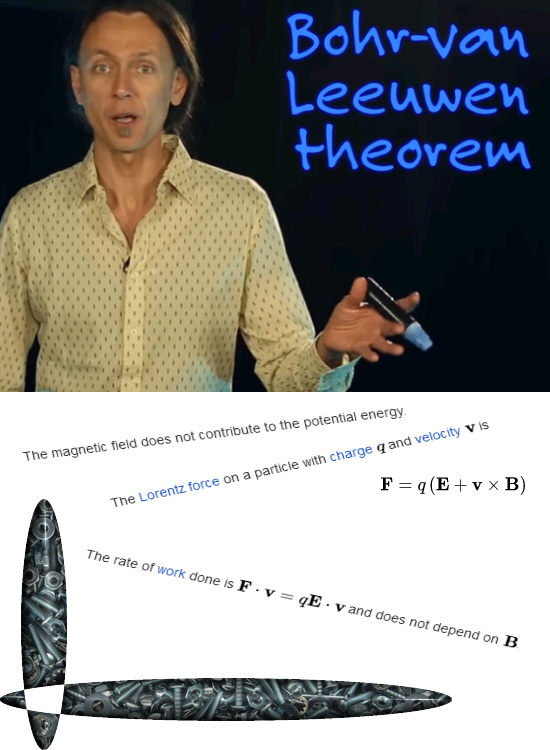It is about high time to make a new post around here. I have not done much lately but I have to admit sometimes I can be lazy as hell. At present I am working on the scalar replacement theorem so likely that is the next post on this website. This replacement theorem says that if you want you can replace the real numbers you use in for example the 3D circular or complex numbers by numbers from the complex plane. I only replace it by complex numbers from the complex plane, the more general version of the replacement theorem is much wider but I often dislike math that is ‘too general’.
On the other website I opened page five on magnetics. Page five means this is the fifth year of writing about electrons and why it is highly unlikely they are magnetic dipoles but magnetic monopoles. As such I stumbled upon the Bohr-van Leeuwen theorem, but that was nothing new only that I did not know it had that name. For me this theorem is just the description used for the forces on an electrically charged particle in and electric and magnetic field. And it says that in a constant magnetic field (that means both constant in time and constant in space), the magnetic field does not do any work. That is there is no acceleration or stuff like that, needless to say I disagree with that. Just take a look at the sun, with the Bohr-van Leeuwen theorem in your hand all that stuff that is going on is hard to explain. Why does the solar plasma accelerate along magnetic field lines? Why is the solar atmosphere, the corona, so hot compared to the surface of the sun? If indeed magnetic fields do not do any work, the sun is hard to understand… (Actually if electrons are magnetic monopoles, the sun is also hard to understand.)
I also found a cute video from about 5+ years back, so likely that was the time it started to dawn upon me that it was impossible that electrons are magnetic dipoles. At that time I tried and tried to understand the results of the Stern Gerlach experiment but how hard I tried it only worked when electrons carried magnetic charge. Until now in the last five years I could not disprove myself, I tried and tried but the longer you think about it the more nonsense it becomes that the electrons are dipole from the magnetic point of view. And to put it simple: Why is there no electric dipole particle? But those people, and I mean of course the people from physics, never talk about stuff like that. Anyway, here is the cute video:
From a screen shot from the video combined with the words from a wiki about the Bohr-van Leeuwen theorem I made the next picture:

As a funny side remark, the guy from the video is from Australia and over there in New South Wales or so they try to make quantum computers based on electron spin qbits. And they think electrons can be in a super position of spin up and spin down, that is in their view as why they can be used as qbits on a quantum computer. Until now (five years later) they still have nothing to show for. Of course when electrons carry magnetic charge, it is very hard to place one electron in a super position state of being a north and a south magnetic monopole at the same time.
Just like in a hydrogen atom where there are two particles named electron and proton that both particles are in a super position of positive electric charge and negative charge. No, the proton always has a positive electric charge and the electron a negative one. So good luck with making a quantum computer based on electron spin…
Ok, I have done enough of the writing words and stuff. May be it is high time to split and may the magnetic force be with you. Till updates.